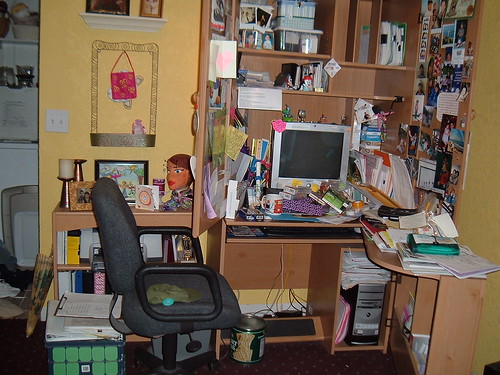 |
| Not my office, but it could be. Flickr photo by EvelynGiggles. |
Confession time: I'm still working on being an organized person.
Now, some of you might laugh hysterically at this. On the surface I seem to be the most organized person on the planet. Just the fact that I can do everything I say I do in my About Me section on this blog proves that I have mastered those pesky organizational skills, right?
But the truth of the matter is that there is still a lot of room for improvement. The last few years have taught me much about organizing people and large projects, but I still can't file to save my life. (My piles work for me...most of the time.) And you do not want to take a look at the rest of the disorganized house I live in. Trust me on this. I blame the children. And The Container Store for charging so much for their cool organizational tools that I can't afford most of them.
 Anyway, I've always been fascinated with the idea of organization. I am one of those people who buys every magazine that lists storage tips on the cover. I routinely check organizational books out of the library (my favorite to date: Organizing from the Inside Out by Julie Morgenstern). I even attempt to organize my life every so often (with mixed results).
Anyway, I've always been fascinated with the idea of organization. I am one of those people who buys every magazine that lists storage tips on the cover. I routinely check organizational books out of the library (my favorite to date: Organizing from the Inside Out by Julie Morgenstern). I even attempt to organize my life every so often (with mixed results).This bring me to the point of this entry: I think having an organized writing life is important, too. Being organized with my writing is a task I am working on perfecting. In fact, here are a few tips I'd like to share about having an organized writing life (okay, they are the things I'm working on myself):
1. Make writing a priority.
What time of the day you write or how much you write during each session isn't as important as the fact that you're putting your writing time on your schedule. I actually hate the word "schedule"--my free spirit finds the word so restraining. I much prefer the term "routine." Either way, the point of this is to make sure writing is at the top of your list and not the bottom. Or close to the top, anyway.
2. Work when you're inspired and work when you're not.
When I first started writing, I only wrote when inspiration hit. That's common for newbies, but incredibly unhelpful if you want to keep writing or make a career with your words. I'm still learning how to push through the days of drudgery and gloom, but it's an important skill to master. Learn to work even if you don't feel like it.
3. Work methodically.
Whatever method you use is fine, but find one that works for you and use it. If you tend to work best by writing chronologically, then do it. If you work best by writing scenes out of order and pulling them together later, then do that instead. If you find it easier to write an outline, by all means, write an outline. And if you work best without one, don't feel pressured to produce one before you start writing. The point is to find a method that helps you be successful. Once you find that groove, you'll find the work is easier to tackle and you'll feel more organized as you work through your manuscript.
Also, be prepared for that method to change with each manuscript. What works for one book may not work for another. And that's okay.
Good luck on getting your own writing life organized. And if you are already organized, good job. I'm not jealous or anything. Honest.
Okay. Maybe just a little.
This is such an interesting post to me, as I describe myself as a perfectly ordered mess. I have a militant filing system at work, structure my day meticulously, and cannot work with too much clutter around. However, ask me where my car keys are, or where I put my hair brush? Hang it up! I'm glad I am in good company.
ReplyDeleteYes, you are in good company. Welcome aboard! We should start a club...only I think I'd probably misplace the bylaws and you'd forget where you hid the keys to the clubhouse. ;)
ReplyDelete